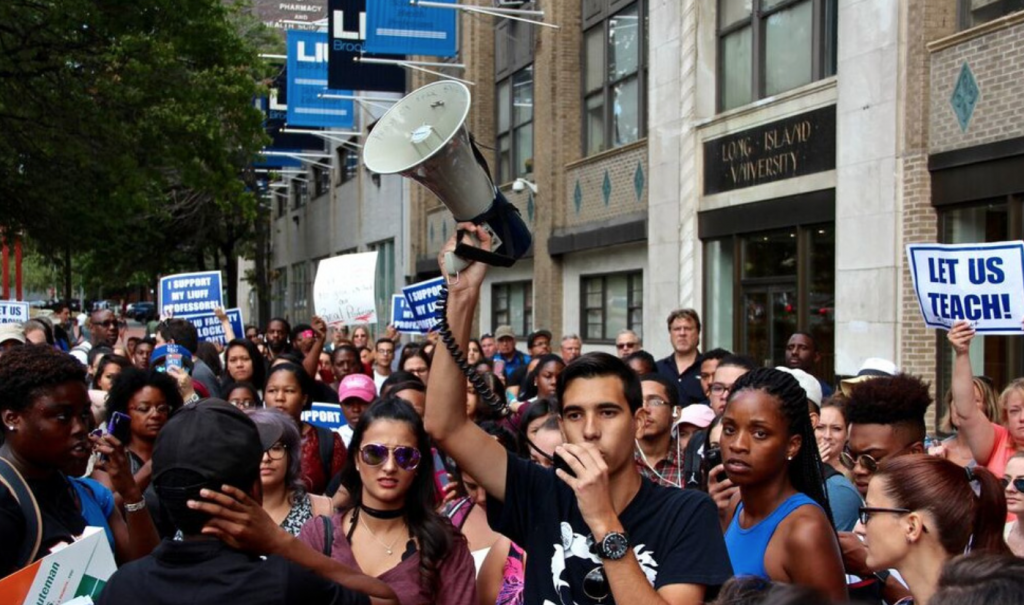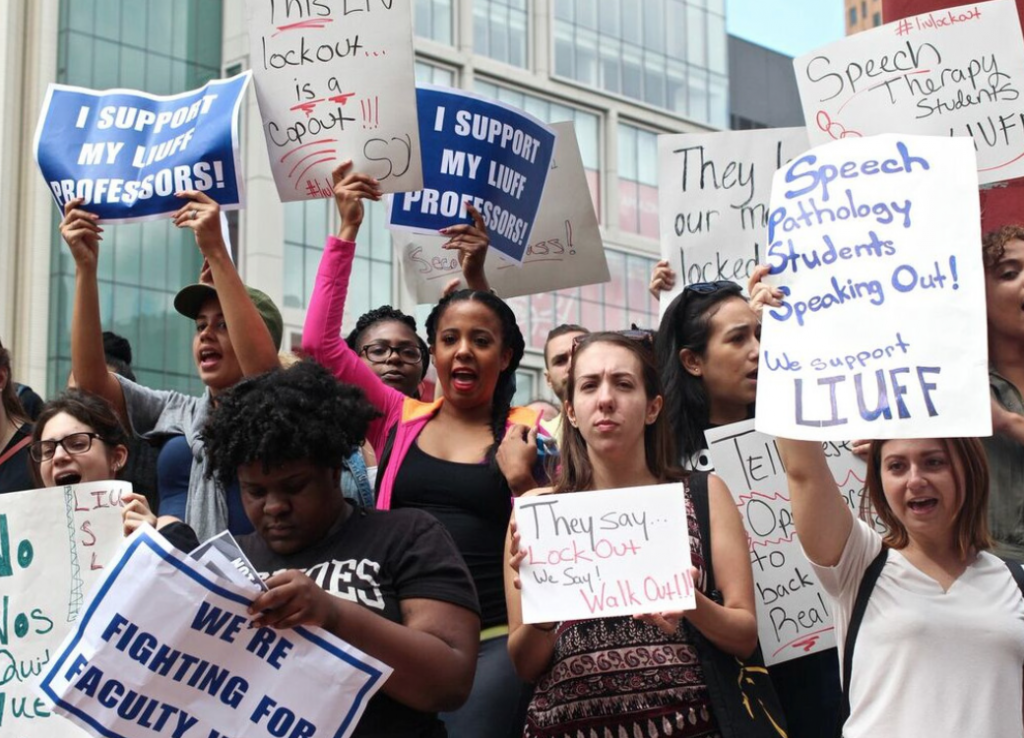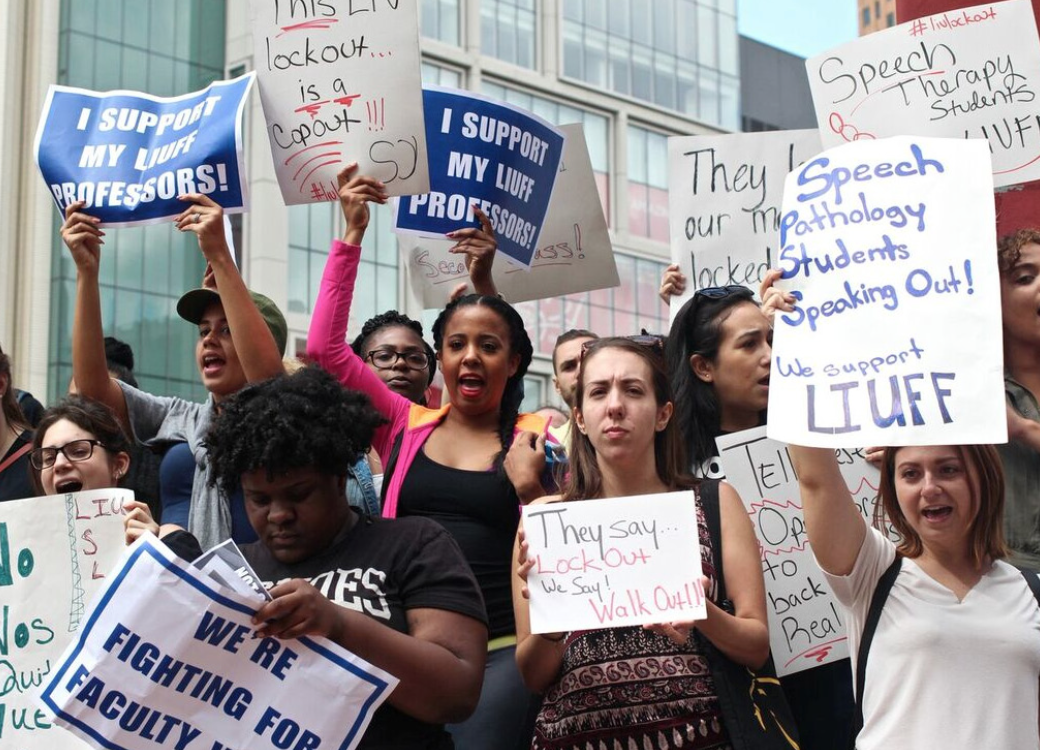By Maxime Devillaz
Editor-in-Chief
Fall semester classes at LIU Brooklyn have begun without its faculty. The Brooklyn faculty union, which includes both full time professors and adjuncts, has been preemptively locked out since Labor Day weekend. The faculty’s current union contract expired on August 31, and the faculty and LIU administration have not agreed upon a new contract, despite ongoing negotiations.

The faculty was “denied access to the campus, had their email accounts blocked and had their health insurance canceled,” according to John Lutz, chair of the English department at Post.
“We never even got a chance to vote on the [proposed] contract,” said Donald Allport Bird, professor of journalism and communication studies for over 37 years at LIU Brooklyn.
The LIU administration explained its decision to lock out the LIU Brooklyn faculty. President Kimberly Cline, Vice President of Academic Affairs Jeff Kane, and Vice President, Chief Operating Officer and University Counsel Gale Stevens Haynes did not respond to inquiries from the Pioneer, which were all referred to the university’s communications office. “Five of the past six contract negotiations with the LIU Brooklyn faculty union have ended in strike votes,” said Jennifer Solomon, communications strategist at LIU. “One strike lasted for nearly two months, leaving our students and the University virtually closed. It is a history that caused harm to students and the University.” When the union issued a strike authorization during pre-negotiation, the administration decided on a lockout to prevent such repeated action, according to Solomon.
The union objected to several items presented in the university’s proposed contract, including cuts for adjunct faculty, and full-timers’ minimum wages being lower than the base salary for faculty at Post. “Other issues revolve around faculty control of curriculum, various work rules that transfer power from faculty to administration, the continuation of the parity clause, cuts to overtime pay for librarians and increases in librarian workload, and the desire by administration to implement post-tenure review, something many of us feel is a step toward infringing on our rights as tenured faculty,” said Emily Drabinski, secretary of the LIU Faculty Federation (LIUFF), and coordinator of library instruction at the Brooklyn campus.
The university responded to this alleged imparity with a statement that Brooklyn faculty “earns salaries above those at most peer institutions,” and added a guaranteed “average wage increase of 13.4 percent over the five-year term with some faculty receiving increases in excess of 22 percent,” according to an article by Heidi Landecker in the Chronicle of Higher Education on Sept. 3
The Post faculty voted in solidarity with their Brooklyn counterparts at an emergency meeting held in Humanities Hall on Thursday, Sept. 8. In an email to the Post faculty, Willie Hiatt, associate professor of Latin American history, shared a resolution of no confidence in President Cline and Vice President Kane, which was introduced and passed at the emergency meeting. The Brooklyn campus faculty senate previously passed its own vote of no confidence in President Cline and Vice President Kane on Tuesday, Sept. 6, with a 135-10 decision.
“In the absence of the LIUFF, classes at LIU Brooklyn have been taught by both hired adjunct professors and University administrators,” Solomon said in an email to the Pioneer. Many have been hired through advertisement on the site monster.com; others are administrators and staffers from Post, although the administration ensures that “all replacement faculty at the Brooklyn campus have advanced degrees,” according to Solomon.
The hiring of replacement faculty has caused concern for professors on both the Post and Brooklyn campuses. Brooklyn Professor Bird grumbled, “People aren’t that interchangeable.”
Post professors are concerned about the absence of administrators who are traveling to Brooklyn instead of performing their administrative duties at Post.
“The staff and administrators at Post are dedicated professionals who will no doubt put in many extra hours to compensate for their absence, but inevitably there will be gaps in support with so many in Brooklyn,” Lutz said. “This decision is unfair to staff and administrators who have not been given a choice in the matter and a disservice to students at both Post and Brooklyn campuses.”

Drabinski expressed empathy towards the replacement teachers, but pointed out that, “people taking these positions aren’t helping themselves in the long term—the jobs are temporary because legally, in a lockout, workers can’t be permanently replaced—and they are letting themselves be the facilitators of the administration’s devastating attack on its faculty workforce.”
In an email to Post faculty members, Hiatt emphasized that administration has not been clear with the compensation being paid to the replacement teachers. “At least in the short term, Human Resources has told substitutes that they will receive $500 per day and a $50 commutation reimbursement,” the email read. “However, if the replacements teach the entire semester, they will receive around $3,000 total.”
Professor Hiatt’s email also touched upon the quality and training of replacement teachers. “One replacement instructor told me that the administration required the substitutes to attend one of four ‘onboarding sessions’ (two at Brooklyn, two at Post),” Hiatt wrote. “Dr. Sterling Jasper of LIU Brooklyn Promise, the facilitator, listed three books on college teaching that replacements should purchase. For the first day of class, Dr. Jasper recommended that the instructor go over the syllabus, divide students into three groups to discuss the syllabus, and then have each group ask questions about the syllabus.”
In addition to the academic concerns for the students, Drabinski expressed concerns about the ultimate financial cost of the lockout. “If you look at the myriad costs of this lockout, from the cash spent to send COBRA paperwork to all faculty via overnight express weekend delivery to the hiring of all these temporary workers to the inevitable legal challenges from students and faculty that will come after the lockout, you begin to see that this is not really about money,” she said. “It is just too expensive to lock us out to think that the reason management is doing this is to cut the small fund that subsidizes some adjunct health care benefits. This is about power, transferring it from faculty to administrators.”
“The current situation at LIU reflects a volatile and challenging era for higher education, particularly for private institutions,” Solomon said, explaining the impact of the 2008 financial crisis. “[We] have seen peer schools face declines in enrollment, donations and endowment returns. Some schools have not survived this turbulent period.”
In its no-confidence vote, the Post faculty has expressed concerns about university management, including the drop in enrollment from 2012, the year before President Cline arrived, to 2016, and the drop in staff from 4,110 a decade ago, to today’s 2,573, according to research published in Newsday. “Experienced staff continues to be fired; others who have left are not being replaced,” Hiatt wrote in his email to faculty. “We continue to see respected friends and colleagues depart with no hope of replacing them.”
Solomon, on the other hand, credits the Cline administration with celebratory results in financial management. “In addition to Standard and Poor’s upgrading [of] the University’s credit rating in April, LIU is part of a group of only three percent of private universities that have received a positive financial outlook,” she said.
“College affordability has become a national conversation,” Solomon said, “and the University has proudly committed to keeping tuition increases at or below 2 percent per year until 2020.” She compared her numbers with an average 3.7 percent tuition increase for private institutions across the country in 2014-2015.
Solomon admits, however, that maintaining this commitment requires the university to balance faculty contribution to the school, and its dedication to budgetary control to serve its students.
“I think what happens with LIU Brooklyn will tell us a lot about what happens to higher education going forward,” Drabinski said. “Is it true that it really doesn’t matter who you have in the classroom?
Do accrediting bodies that are charged with ensuring the quality of education at higher education institutions take that mission seriously? Do they see teaching and learning as a part of that quality? Is higher education about anything other than budget lines and credit ratings?”
Negotiations between LIU administrators and the Brooklyn faculty union resumed on Monday, Sept. 12, and both parties have expressed willingness to find common terms, sooner rather than later. “Faculty really want to be back in the classroom,” Dubinski said. “We are hopeful that we’ll be back in our classrooms with our [students] soon.
We want to teach the students at LIU Brooklyn.”







Be First to Comment